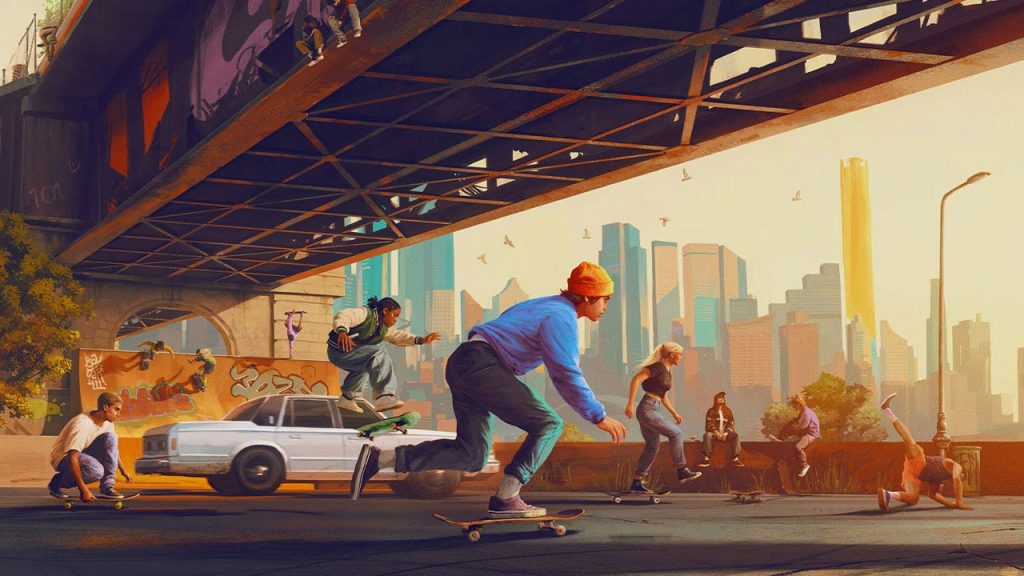EA’s official Skate FAQ clarifies what the early access iteration set for 2025 means for the franchise: “This isn’t a sequel, remake, or a remaster,” it asserts. “It’s the evolution of the Skate franchise.” I agree that this isn’t Skate 4 and certainly not a remake of the originals. However, it is an evolution, albeit one that strays far from the late-2000s titles I cherish. This revamped Skate has evolved significantly, but in a way that aligns it with the free-to-play model, feeling sanitized and monetized. The dramatic changes have made it hard for me to connect with this new version, which seems to blend into the landscape of contemporary gaming like a moth in the gritty cities of historic Britain.
While I have reservations, there are strengths in Skate’s early access launch, particularly the sound effects. The game excels at capturing the complex sounds of skateboarding—the hiss of wheels, the friction on various surfaces, and the clatter of metal. These sounds are the heartbeat of skateboarding and create a soothing rhythm when in the flow of gameplay. The sound design truly serves the experience, enhancing immersion.
As for the feel of Skate itself, being on the board remains a joy. While I appreciate the arcade craziness of titles like Tony Hawk’s Pro Skater and the precision of simulation games like Session, Skate’s control system is both inviting and nuanced. Tricks are performed with the right stick, turns with the left, and various other actions are intuitive, offering depth once you grasp the mechanics.
Issues with the New Render
However, the new Skate does not perfectly replicate the feel of its predecessors. Turning is noticeably stiffer and misses the organic leaning characteristic of earlier games. The grind assist feels overly sticky, and there is some awkwardness in transition skating. Although some elements are missing, like skitching and certain tricks, Skate generally captures the familiar, smooth sensation of street skating from the original titles. This return to form is welcome, but it doesn’t account for the numerous changes that have impacted the essence of the game.
Online Missteps
Making Skate an entirely online experience has proven to be a significant error. During my first play session, I was abruptly disconnected during a challenge, returning to the main menu, which felt ironic given my grievances with the game. Server issues are commonly experienced during the launch of online games, but it has been frustrating. Instead of enjoying the game, I spent time playing the classic Skate trilogy, which remains accessible offline.
Moreover, the new game has lost much of the personality that characterized the originals. The upgrade seems to have replaced authentic characters with a corporate sheen, a glaring shift in tone. Instead of relatable caddies, we now have a lifeless AI app named Vee, whose annoyingly robotic dialogue lacks charm and originality. The warmth and character of the old games have been stripped away, leaving behind a sanitized, child-friendly version that feels disingenuous.
Art Style and Gameplay Concerns
Skate’s art style also falls flat, featuring a bland visual approach that contrasts sharply with the celebrated realism of earlier installments. The overly simplistic character models add to the overall sense of detachment. The environment feels sterile, lacking the texture and detail that would make it immersive. Playing the game often becomes frustrating as other players appear glitchy, hindering the experience.
In conclusion, while the early access version shows promise in terms of sound and controls, it struggles with its online format, voice acting, art style, and overall personality. The evolution of the franchise is evident, but it feels like a compromise that favors monetization over genuine gameplay, transforming Skate into a service-oriented product instead of a substantive game. As it stands, Skate’s identity remains clouded, leaving me nostalgic for the original experiences.



